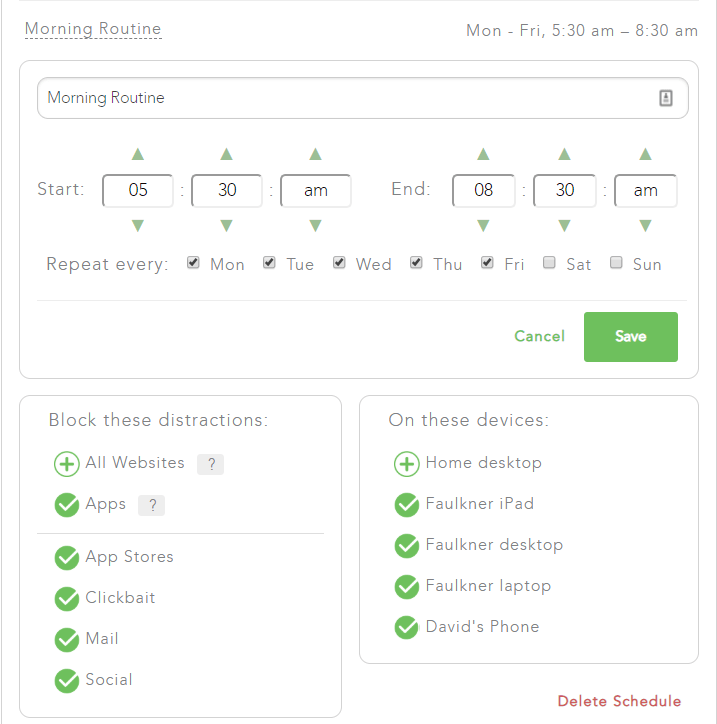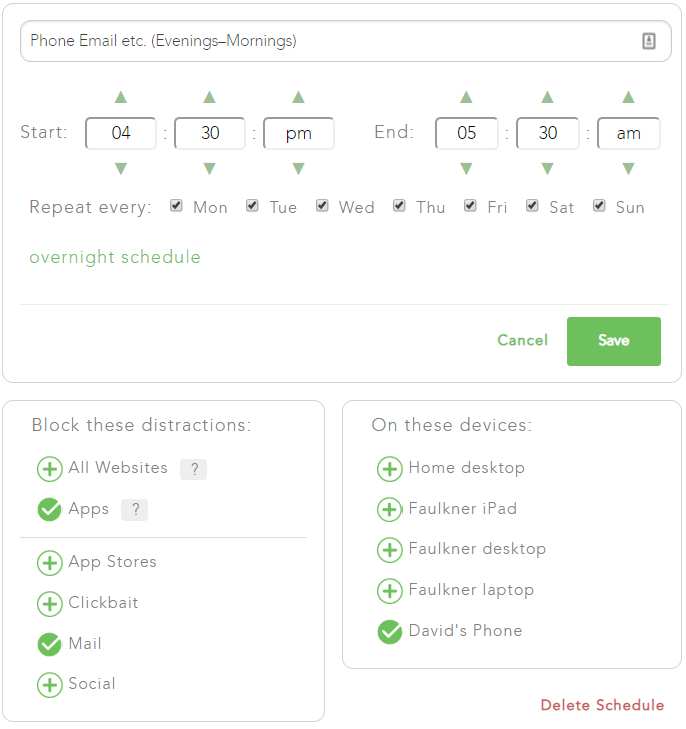If you struggle with online distractions, you don’t have to battle them by yourself.1 You can use Freedom to support your choice to focus on what matters most.
If you don’t struggle with online distractions, that’s wonderful. But distractions can involve more than the trivial things we might immediately think of in this category.
Even “productive” activities can be distractions when they pull us away from where we really should putting our attention.
For Example, Email
For me, it’s email. It’s been email for years.
And in the near future, I don’t see it being very likely that I’ll suddenly stop wanting to check email more than is helpful for other priorities.
Has that editor written back? Does a student need a response? Has a colleague sent a document? Has a committee discussion moved forward?
These questions and others like them are all good ones that can get answered in email. But if I’m repeatedly doing email “quick checks,” I find I accumulate quite a bit of “attention residue.”
As Cal Newport describes,
When you switch from some Task A to another Task B, your attention doesn’t immediately follow—a residue of your attention remains stuck thinking about the original task…. It might seem harmless to take a quick glance at your inbox every ten minutes or so…. But … [t]hat quick check introduces a new target for your attention.
Deep Work, pp. 42–43; italics original.
And because there’s a “new target” for my attention, my attention can’t be as fully where it should be—whether that’s writing, working on a class, or spending time with my family.
Your online distraction of choice might be different. But if this tune sounds familiar and your self-discipline against distraction could use a boost, read on.
I’ll share how I use Freedom to help me focus on what matters at the times when email shouldn’t. You can apply the same techniques to use Freedom to support your own unique priorities.
1. Repeating Scheduled Sessions
1.1 In the Morning
I’m normally in the office on weekdays 7:30 to 4:30. And I have a regular set of things I do to start the day from 7:30 to 8:30, including the daily Bible readings that go along with the classes I teach.
It’s sometimes been tempting to begin by checking email after I get up or to “take a break” from a tough sentence in the biblical text. So I’ve created a repeating Freedom session that runs from 5:30 to 8:30 every weekday.

This session blocks more than just email and other things that would be distractions during this time. It also blocks these sites and services on the different devices I might have nearby.
1.2 In the Evening
When I’m not at the office, the main email temptation is my phone.
This is true even though I almost never reply to email from my phone since I’d much rather type on a real keyboard.
I tried removing the Gmail app but still found it too easy to open Chrome, type in “gmail.com,” and do a “quick check” there.
So I also made myself a recurring session to block Gmail just on my phone in the evenings and overnight.
(If our little one needs someone to get up with her during the night, it might be my turn. Do I really need to see an email I can’t respond to and that then keeps me awake thinking about it?)

If I do need to do some email in the evening, I can still do that from an actual computer.
It just has to be a decision I own by being physically in front of a computer rather than a reflex I slip into when pulling out my phone.
2. Custom Sessions
For a while, I tried to use scheduled Freedom sessions during the day.
I already had my calendar time blocked. So setting up Freedom sessions to run along with these same time blocks seemed to make sense.
What I realized, though, was that my calendar changes far too frequently for this to work well for me. Instead of making a change to a given time block just on the calendar, I’d also need to change a scheduled Freedom session.
But normally once a day begins, the calendar is pretty well set. So instead of trying to use recurring Freedom sessions during the day, I added a step to my morning routine.
Now, as part of that time, I look at the day’s calendar and create whatever Freedom sessions look like they will be helpful for that day.
If I’m working on grading, preparing for class, or doing some writing, the whole day might be one Freedom session except for the time specifically set aside for clearing out my inbox.
Or if I need do different kinds of activities during the day, I might schedule two or three separate Freedom sessions with different block lists for the times of the day when I plan to work on those projects.
Conclusion
You may find different Freedom helpful in much different ways given how your days and weeks look.
But Freedom can be a powerful tool. It’s powerful because it extends our self discipline.
It allows us to set priorities for our time ahead of time when we’re thinking clearly about what’s most important. That way, we don’t need to re-make that decision constantly over against our favorite distractions or “quick checks” that might dilute our focus on those priorities.
So, if you don’t already use Freedom, give it a try. If you’re like me, you’ll find that it much more than pays for itself in the amount of attention it helps you put where you really want to have it.

Leave a Reply